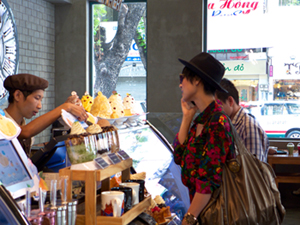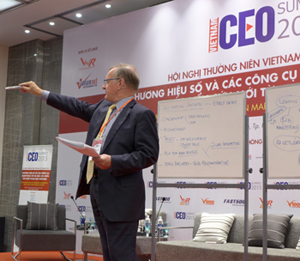July 11, 2015 marked the 20th year since President Bill Clinton announced normalization of relations with Vietnam and, over the past two decades, the US and Vietnam have developed a relationship encompassing business and travel, as well as strong academic, cultural and foreign policy ties.
|
|
When I worked on reconciliation and opening trade with Vietnam in the 1990’s, American corporations such as IBM, Pepsi including its then KFC, United Technologies and Gillette rushed in to establish their brands among 70 million Vietnamese consumers—a population that has grown to 90 million today. Individual entrepreneurs moved in too, among them Long Islander Alfonso DeMatties who established a successful construction company venture and Los Angeles photographer David Jacobson who opened his Q Bar in the basement of Saigon’s Opera House to cater to the burgeoning expat community. Q-Bar became so famous it was even featured in Doonesbury.
My how things have changed. In two decades, the once familiar pedicabs are all but gone—Ho Chi Minh City is building a subway now to cut street congestion. The demure Ao Dai, the traditional Vietnamese outfit is gone—save for hotel front desk clerks and airline greeters. Prosperous millennials are everywhere—often frequenting shops and cafés on Dong Khoi Street—formerly Tu Do Street, which was known to American GIs for beer, bar girls and brawls instead of trendy fashions and lattés.
In the 90’s Americans saw Vietnam as a new frontier to sell US brands, get cheap labor and buy agricultural products. Vietnam became a hip travel destination for the been-there-done-that crowd. Now 400,000 Americans and 100,000 Canadians from all walks of life are expected to visit Vietnam this year according to Vietnamese government figures. In Saigon center alone there is a modern Hyatt hotel and the Caravel, the informal headquarters for war correspondents, has been rebuilt into a modern structure. The old Continental Hotel and Rex Hotel have been modernized to international four star standards. There’s a new skyscraper too. The blade-shaped Bitexo Financial Tower, designed by New York architect Carlos Zapata, has become the iconic structure in the new and modern Ho Chi Minh City.
Over the past two decades, The US-Vietnam relationship has become much more intertwined and far more multifaceted. Americans now buy a greater variety of Vietnamese products including electronics, clothing, rice, coffee and oil than they sell—$30.6 billion, with US exports to Vietnam at $5.7 billion last year. Cultural and academic ties are far more numerous and Vietnam has also become the key US ally in maintaining the balance of power in the Pacific.
Among those building America’s awareness of the full scope of what Vietnam has to offer is Tuan Anh Nguyen. Nguyen founded VietnamNet.vn, the country’s biggest online newspaper and, together with former Massachusetts Governor Michael Dukakis and several Harvard University faculty members, co-founded a new think tank—Boston Global Forum. The Forum’s goal is to develop peaceful solutions to conflicts between nations—this year it is focusing on an ethical framework for behavior on the Internet. Last year the Forum delved into the vital role Vietnam, Japan and the US play in maintaining the balance of power in the Pacific and recommended a framework for peaceful and security solutions to China’s projection of power over the Spratly Islands and trade routes in region.
In addition to foreign policy, Nguyen, who lives in Boston, has launched several initiatives aimed at building awareness of Vietnam for business, information technology, scientific research and the arts. Six years ago, for example, he worked with the late Maestro Charles Ansbacher to establish a series of free reconciliation concerts performed every summer at both the Hanoi Opera House and the Hatch Shell in Boston. Maestro Ansbacher became the first American to lead the Vietnam National Symphony Orchestra in Hanoi. Nguyen together with Ambassador Swanee Hunt are founders of the Charles Ansbacher Music For All Award.
|
|
To promote Vietnam’s knowledge-based economy, Nguyen organized a conference in Nha Trang, a coastal resort city in Khanh Hoa Province, where scientists from Khanh Hoa University briefed delegates, scholars and journalists from the US, Japan and India on the region’s role in sustainable fishing and coastal development and research into new pharmaceuticals derived from marine resources.
Also marking the 20th anniversary, Boston Global Forum organized a CEO Summit in Ho Chi Minh City that drew some 200 Vietnamese business owners seeking advice from Harvard professors, American journalists and marketing professionals on how to market their products in the US.
Prof. John Quelch of Harvard Graduate School of Business Administration led the all-day discussion, reviewing Harvard Graduate School of Business case studies on The New York Times transition to the digital age and Amazon’s phenomenal success as an online marketer, which is in stark contrast to Vietnam where retail outlets specialize in single products. In Cho Lon’s market area for example, the store that sells motorcycle helmets does not sell motorcycle attire or motorcycles and a merchant carrying fabric, does not sell sewing needles.
Prof. Quelch told the delegates, “Though you might be tempted to use Vietnam in the brand name of your products, failure is almost assured. American Express and Columbian Coffee, personified by the fictional Juan Valdes, are just about the only successful exceptions when it comes to naming a major brand after a country.”
Prof. Quelch’s overarching advice to Vietnam’s business owners is to differentiate: “Look at the UN as a supermarket aisle with 192 products on the shelf including those from Vietnam. If you want to get your products at eye level, if you want to sell your products, you must have a crystal clear value proposition. If the proposition is price alone, it will not be sustainable.”
In terms of establishing a multifaceted identity for Vietnam, Prof. Quelch underscored the work Khanh Hoa University is doing to position itself and, in turn the nation, among the world’s scientific community. “In the knowledge-based economy, Vietnam is developing its position as a leader in marine science and sustainable marine resource management. This has a great deal of credibility, given the country’s long coastline and dependence on the sea.”
He also noted that an eight square-mile Peace and Innovation Center, aimed at attracting scientists, scholars, artists and musicians from around the world is on the drawing boards for Nha Trang, already popular among Asians and Europeans.
Prof. Quelch observed, “Americans have moved away from perceiving Vietnam in the context of the War, save for families who lost loved ones. For Americans 30 years old or younger, Vietnam is blank slate.”
The same holds true for Vietnamese—60 percent of its populations was born after the American War ended in April of 1975—40 years ago. Nguyen, who was a child at the time and living in North Vietnam recalled of those years, “By that time we just wanted the war to end.”
“To put that 40-year time span in perspective, 1985 marked the 40th anniversary of the end of World War II. Americans were driving BMWs and Toyotas with hardly a thought of war and the Japanese and Germans were listening to Phil Collins and Journey.
In addition to world trade, foreign policy and cultural ties, the growing relationship between Vietnam and the US is evident in small ways too. For instance, it’s a sure bet that Vietnam is integrated into our popular culture when Modern Family character Cam Tucker can pull off a comical bit on how American’s can’t pronounce Pho, the traditional Vietnamese soup. Cam tries a couple of pronunciations on his adopted Vietnamese daughter's pediatrician, who finally quips, "I wouldn’t know, I’m Japanese."
Modern Family is the most watched series on American television, drawing an audience of 10 million—that means the writers are counting on a huge cross-section of Americans to have enough awareness of Vietnam to get the joke. And, when you can comfortably bring in humor, that is a big deal in terms of a solid relationship.
* * *
Dick Pirozzolo, managing director of Pirozzolo Company Public Relations in Boston, began his career as an information officer during the Vietnam War and promoted reconciliation throughout the 1990’s. Dick is working with journalist Michael Morris, on a novel about the end of the war to be released by White Horse Publishing, New York in 2016.




 Britain's Portland PR has recruited Scott Nolan Smith from the UK embassy in Washington to handle media/digital engagement, diplomatic communications and international affairs.
Britain's Portland PR has recruited Scott Nolan Smith from the UK embassy in Washington to handle media/digital engagement, diplomatic communications and international affairs. The US needs to "do more to harden our soft power" to best combat Russia's 24/7 propaganda machine and counter the rise of ISIS, according to Rick Stengel, US Undersecretary for Public Diplomacy.
The US needs to "do more to harden our soft power" to best combat Russia's 24/7 propaganda machine and counter the rise of ISIS, according to Rick Stengel, US Undersecretary for Public Diplomacy. The U.S. Senate, 90-8, on Tuesday confirmed former Time magazine managing editor Richard Stengel as Under Secretary of State for Public Diplomacy and Public Affairs, the country's top foreign propaganda slot.
The U.S. Senate, 90-8, on Tuesday confirmed former Time magazine managing editor Richard Stengel as Under Secretary of State for Public Diplomacy and Public Affairs, the country's top foreign propaganda slot.


 Have a comment? Send it to
Have a comment? Send it to 
No comments have been submitted for this story yet.